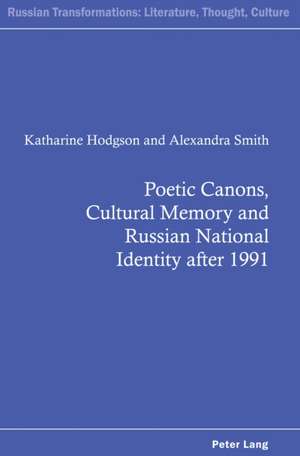Poetic Canons, Cultural Memory and Russian National Identity after 1991: Russian Transformations: Literature, Culture and Ideas
Autor Alexandra Smithen Limba Engleză Paperback – 27 feb 2020
Preț: 520.46 lei
Preț vechi: 675.93 lei
-23% Nou
99.60€ • 108.15$ • 83.67£
Carte tipărită la comandă
Livrare economică 22 aprilie-06 mai
Specificații
ISBN-10: 1787079023
Pagini: 520
Dimensiuni: 152 x 229 mm
Greutate: 0.7 kg
Editura: Peter Lang Copyright AG
Seria Russian Transformations: Literature, Culture and Ideas
Notă biografică
Alexandra Smith is Reader in Russian Studies at the University of Edinburgh. Her research interests include literary and film theory, critical theory, Russian literature of the nineteenth to the twenty-first centuries, intermediality and the history of ideas. She is the author of The Song of the Mockingbird: Pushkin in the Works of Marina Tsvetaeva (1994) and Montaging Pushkin: Pushkin and Visions of Modernity in Russian Twentieth-Century Poetry (2006).
This book is the result of a project led by the authors and funded by the Arts and Humanities Research Council (AHRC), which explored the way attitudes towards the cultural legacy of the USSR have evolved since 1991. A co-edited book (with Joanne Shelton), Twentieth-Century Russian Poetry: Reinventing the Canon, appeared in 2017.
Cuprins
CONTENTS: Katharine Hodgson: The Appeal of Empire and the Attempt to Propose a New Nationalist Canon - Katharine Hodgson: The Canon of War Poetry and Commemoration, 1995-2010 - Katharine Hodgson: Village Poetry: Reinventing a Lost World - Alexandra Smith: Russian Gulag Poetry and its Reception: Marginalizing National Trauma - Alexandra Smith: Rediscovering the Religious and Elegiac Roots of Russian Lyric Poetry: Soviet Underground Poets as Anna Akhmatova's Heirs - Alexandra Smith: The Pushkin Myth in New Contexts: Post-Soviet Rewriting of the Tradition - Alexandra Smith: Post-Soviet Parody, Ironic Musings, and a New Poetic Canon - Alexandra Smith/Katharine Hodgson: Conclusion: Russian National Identity between Triumphant and Traumatic Memory.





